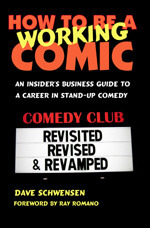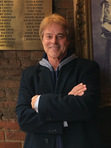Always ask before you audition
Hey Dave – I have a big audition coming up. I’m not going to have any profanity in my (comedy) set, BUT I’m thinking of having a cleaner version and one that is a bit edgier. I’m thinking of asking the panel of judges what type of set they want before I perform. Do you think this is a good idea? Thanks – DS
Hey DS – Yeah, I always think it’s a great idea to ask the judges at a contest – or talent booker for a club or any other venue you’re showcasing for – about restrictions they might have on material and language. In fact I emphasize this point in my workshops for a couple reasons:
It shows experience. You can adjust your material depending on the audience – and talent bookers like that. (It’s a business – remember?)
It can give you an edge over the competition. I know I talk a lot about how supportive the comedy industry is (nothing has changed my mind about that), but the bottom line is that they can’t hire everyone so you need to stand-out at showcases. Again – think business.

Take a number and
wait your turn…
For an example, there may only be five performance spots available for a television show. But you know as well as I do that a LOT more than five comics will be auditioning. Of course being funny is the No. 1 factor – and face it, sometimes it’s who you know (am I right Hollywood comics?!).
So let’s assume everyone at the showcase is funny and knows the same people – so those requirements are met. The tie-breaker would be knowing who the audience will be and adjusting your material and performance for that audience.
You’re not gonna do the same set on Barney and Friends that you’d do on a Comedy Central Roast. Get it?
If you’re auditioning for work on a cruise ship and walk out dropping “F-Bombs” and complaining about your sex life, you might as well pack your bags and consider a career on dry land. Half the on board comedy shows are early evening family events with blue-haired ladies and their preteen grandchildren in the front rows. Later on the parents will go out for the “adult
humor” comedy shows by the same comics in one of the ship’s late night lounges after the kids are asleep. But if you can’t play to both crowds, you don’t get paid.
How would you know this if you’ve never been on a cruise or had a chance to pick the brain of someone who works cruise ships? My strategy would be to ask the person auditioning you for the gig BEFORE you audition.
Of course this advice means nothing if you’re already settled into who you are on stage (your comedy voice) and it doesn’t work in certain venues. Trust me, I’m not trying to push everyone in the same direction or preach work clean at all costs. That would only create comedy clones and make the industry pretty boring.
Think “Corporate Rock” and you’ll know what I’m referring to.
Comedy is a creative art and a form of free speech. If you want to be an x-rated comic, go for it. Just don’t go to showcases where you’re unsure if your style will be acceptable for work (like a kid’s show or family cruise). You’re not only wasting your time, but also taking opportunities away from other comics who would want to audition for the gig.
Another example of knowing beforehand what you CAN talk about vs what you can NOT talk about depending on the audience…
———————————————————————————
Sign up now for Dave’s free weekly newsletter and
receive 15% off the Amazon.com list price!
———————————————————————————
When I booked A&E’s An Evening at the Improv, we had certain “rules” for the performances. During a noon meeting with the comics who were taping the show that night I’d go over the rules…
Don’t make fun of God or religion. Our highest ratings were in The Bible Belt and we didn’t want to lose viewers. Higher ratings attract sponsors (again – think business)
Don’t knock specific products because we didn’t want to be sued. You can’t say a certain car is dangerous or a certain fast food restaurant will give you food poisoning. (Do I need to say it again – business?)
Don’t sing a song parody for longer than (I think it was) 18 seconds. Producers were not going to pay song royalties for television broadcast, which is what would happen if any song was played for longer than (I think it was) 18 seconds. At that time it seemed a lot of comics were singing funny words to The Brady Bunch Theme Song. They could do it – but it would be cut out if it went over the time limit of being “free.” (This time – music business rules)
What about comics that didn’t follow the rules? If you watch reruns of A&E’s An Evening at the Improv, keep in mind the comedians were each given 7 minute sets. But some are on screen for less time – like only 4 or 5 minutes. What’s up with that?

Sweatin’ out the cuts
They didn’t follow the rules. In the business it’s easy to correct these mistakes in an editing room – or in the case of live performances, auditioning the acts first and not hiring the ones that can’t follow the guidelines.
In fact when it comes to working clubs, I can’t even think of a situation where you wouldn’t have an opportunity before showcasing to ask the talent booker if there’s anything you shouldn’t say or talk about. Even if it’s only in an email or phone call prior to going there. They should be straight with you, since they know their audience and what they’re looking for better than anyone else.
For any audition associated with television or a “larger than a comedy club” market (think colleges, cruise ships, corporate…) your best bet is to do clean material. Everyone in the comedy biz who knows anything about anything knows comics can “dirty it up” when they have to.
The goal for talent bookers is to find comics that can appeal to the venue’s audience. As a performer, you need to find that out. And unless your talent is mind-reading, the best way I know to do that is to ask.
——————————————————————————-
Dave Schwensen is the author of How To Be A Working Comic: An Insider’s Business Guide To A Career In Stand-Up Comedy, Comedy FAQs And Answers: How The Stand-Up Biz Really Works, and Comedy Workshop: Creating & Writing Comedy Material for Comedians & Humorous Speakers.
For information about these books, comedy workshops at The Cleveland Improv, and private coaching for comedians and speakers in person, by phone or via Skype visit www.TheComedyBook.com
Copyright 2013 – North Shore Publishing








